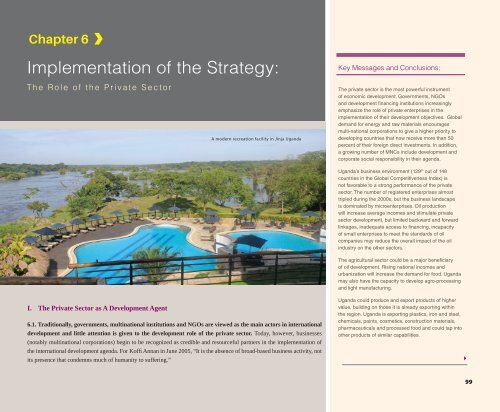Economic Diversification and Growth
71mK301zeG0
71mK301zeG0
You also want an ePaper? Increase the reach of your titles
YUMPU automatically turns print PDFs into web optimized ePapers that Google loves.
Chapter 6<br />
Implementation of the Strategy:<br />
Key Messages <strong>and</strong> Conclusions:<br />
The Role of the Private Sector<br />
A modern recreation facility in Jinja Ug<strong>and</strong>a<br />
The private sector is the most powerful instrument<br />
of economic development. Governments, NGOs<br />
<strong>and</strong> development financing institutions increasingly<br />
emphasize the role of private enterprises in the<br />
implementation of their development objectives. Global<br />
dem<strong>and</strong> for energy <strong>and</strong> raw materials encourages<br />
multi-national corporations to give a higher priority to<br />
developing countries that now receive more than 50<br />
percent of their foreign direct investments. In addition,<br />
a growing number of MNCs include development <strong>and</strong><br />
corporate social responsibility in their agenda.<br />
Ug<strong>and</strong>a’s business environment (129 th out of 148<br />
countries in the Global Competitiveness Index) is<br />
not favorable to a strong performance of the private<br />
sector. The number of registered enterprises almost<br />
tripled during the 2000s, but the business l<strong>and</strong>scape<br />
is dominated by microenterprises. Oil production<br />
will increase average incomes <strong>and</strong> stimulate private<br />
sector development, but limited backward <strong>and</strong> forward<br />
linkages, inadequate access to financing, incapacity<br />
of small enterprises to meet the st<strong>and</strong>ards of oil<br />
companies may reduce the overall impact of the oil<br />
industry on the other sectors.<br />
The agricultural sector could be a major beneficiary<br />
of oil development. Rising national incomes <strong>and</strong><br />
urbanization will increase the dem<strong>and</strong> for food. Ug<strong>and</strong>a<br />
may also have the capacity to develop agro-processing<br />
<strong>and</strong> light manufacturing.<br />
I. The Private Sector as A Development Agent<br />
6.1. Traditionally, governments, multinational institutions <strong>and</strong> NGOs are viewed as the main actors in international<br />
development <strong>and</strong> little attention is given to the development role of the private sector. Today, however, businesses<br />
(notably multinational corporations) begin to be recognized as credible <strong>and</strong> resourceful partners in the implementation of<br />
the international development agenda. For Koffi Annan in June 2005, “It is the absence of broad-based business activity, not<br />
its presence that condemns much of humanity to suffering.”<br />
Ug<strong>and</strong>a could produce <strong>and</strong> export products of higher<br />
value, building on those it is already exporting within<br />
the region. Ug<strong>and</strong>a is exporting plastics, iron <strong>and</strong> steel,<br />
chemicals, paints, cosmetics, construction materials,<br />
pharmaceuticals <strong>and</strong> processed food <strong>and</strong> could tap into<br />
other products of similar capabilities.<br />
99


